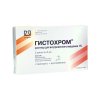Histochrom

HISTOCHROM is a highly effective drug; has no structural analogs.
The therapeutic effect is based on ability of HISTOCHROM to capture free radicals and stabilize cell membranes. As also known, ferrous cations accumulate in myocardium tissue damaged by ischemia, and initiate non-enzymatic oxidation of membrane lipids. In contrast to basic endogenic cardioantioxidants (vitamin A and ubiquinon), HISTOCHROM neutralizes these cations and prevents myocardium from toxic peroxides.
Biochemical investigation revealed the ability of HISTOCHROM to restore damage of the calcium-transporting system and decrease levels of creatine kinase in myocardium. HISTOCHROM selectively influences humor and cellular immunity; has anti-inflammatory activity.
HISTOCHROM is applied in two medicinal forms:
- HISTOCHROM for cardiology is a highly effective preparation for prophylaxis of reperfusion damages after myocardial infarction; for treating ischemia and infarction in acute forms.
- HISTOCHROM for ophthalmology is prescribed for diseases of cornea (to increase epithelization); as a retinoprotector for dystrophic damages of retina and diabetic retinopathy; for proliferous processes, degeneration and hemophthalmia of various geneses; for contusions, burns and penetrating wounds of eyes; for cataract, keratitis and uveitis.
HISTOCHROM was clinically tested at four leading cardiological and three leading ophthalmologic hospitals in
Composition of this preparation and methods for its obtaining, as well as the treatment of hemophthalmia and burns of eyes using
Both forms of HISTOCHROM are covered by several patents belonging to G.B. Elyakov Pacific Institute of Bioorganic Chemistry of the Far-Eastern Branch of the
Ministry of Health of the
